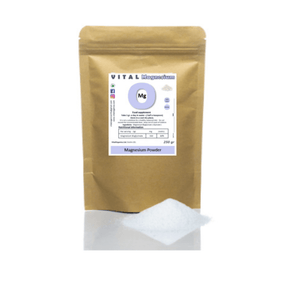Magnesium is the eleventh most abundant mineral element in the human body. A fully grown human body contains about 24 grams of magnesium (60% is found in the skeleton, 39% in the muscle cells, and 1% extracellular).
Magnesium is an important nutrient for the human body, because it’s part of many important processes that help maintain health, especially in your brain, heart, and muscles.
Research published in Nutrition Reviews found magnesium deficiencies to be present in approximately 50 percent of people. The recommended magnesium dose varies dependent on age, gender and physiological conditions. According to research magnesium supplements have been shown to help with
- Migraine
- Anxiety
- Chronic pain
- Heart disease
- Diabetes
One of the supplements often used for these types of deficiency is magnesium glycinate, which is magnesium bound to a glycine. This type of Magnesium has very good absorption levels which means the bodies uptake of this type of magnesium is better utilized once digested.
Magnesium powder has a laxative action; please do not exceed the advised dosage unless you wish to use it as laxative agent.
Dosage
How much magnesium should I take:
The magnesium recommended daily dose is 320mg for women and 420mg for men.
The majority of us do not absorb enough magnesium and people who do not receive enough typically feel sluggish and stressed. Magnesium also helps the body absorb and metabolize vitamin D. without magnesium, vitamin D is not as useful and can cause calcium to build up which can lead to kidney disease and other health complications.
Vitals magnesium glycinate comes in a powder form so its easily dissolvable in water and juice and dosing is easier. Take half a teaspoon daily.
When taken before going to bed it will facilitate your relaxation and sleep
Benefits
Magnesium glycinate has been shown to have variety of benefits including the following:
- It has a calming effect on the brain due to the presence of glycine.
- It can relieve anxiety and promote better sleep
- It helps keeps the bones strong by maintaining healthy bone density.
- It helps control blood sugar in people with diabetes and may lower the risk of developing diabetes
- It decreases abnormal heart rhythms.
- It reduces premenstrual syndrome (PMS) symptoms
Given its gentle yet beneficial effect on the body, magnesium glycinate and magnesium carbonate can be used ton treat a variety of conditions. According to a study published in the journal of pain and relief, these include:
- Chronic pain
- Overall muscle flexibility
- Quality of life in general
Certain conditions or risks improve with magnesium supplementation such as:
- Fibromyalgia
- Chronic fatigue syndrome
- Risk of heart failure, stroke and diabetes
Read more
Why is it beneficial to supplement with magnesium:
Magnesium is needed for more than 300 biochemical reactions in the body. It helps to maintain normal nerve, healthy neurological function and muscle function, supports a healthy immune system, keeps the heartbeat steady, and helps bones remain strong. It also helps adjust blood glucose levels, and aids in the production of energy and protein.
Some people are at increased risk of magnesium deficiency, including people with digestive disorders, such as celiac disease and chronic diarrhoea; certain conditions and an unhealthy diet can cause your body to lose magnesium quicker than you can replenish it.
In addition, certain medicines (including some “water pills” and antibiotics) can lower blood magnesium levels.
Magnesium is a natural muscle relaxer, which immensely helps with anxiety. Magnesium deficiency is quite common and could cause serious health issues when not addressed.
Magnesium deficiency:
Symptoms of magnesium deficiency are linked to:
- Hypertension and cardiovascular disease
- Coronary heart disease stroke and abnormal heart rhythms
- Osteoporosis
- Decreased insulin sensitivity – type 2 diabetes and weight gain
- Asthma – it can relieve symptoms
- Migraines and headaches
- Inflammation
- Damage of the inner lining of the blood vessels and nerve cells which lead to depression
- Impairments in exercise performance – cramping contractions with tingling
- Gastrointestinal issues
Magnesium deficiency can cause also other mineral deficiencies, as all minerals work together at keeping the body healthy.




